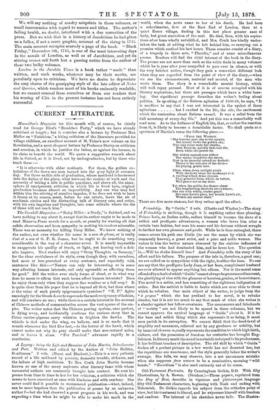A Legacy; being the Life and Remains of John Martin,
Schoolmaster and Poet. Written and edited by the Author of "John Halifax, Gentleman." 2 vols. (Hurst and Blackett.)—This is a very pathetic record of a life saddened by poverty, domestic trouble, sickness, and the failure of high ambitions. To Mrs. Craik John Martin became known as one of the many aspirants after literary fame with whom successful authors are commonly brought into contact. He sent his poems from time to time to her for her criticism, a criticism which she seems to have exercised at once with kindness and with candour. She never could find it possible to recommend publication—what, indeed, can be more hopeless than the publication of poems by an unknown author ?—but she had observed a great progress in his work, and was expecting a time when he might be able to make his mark in the world, when the news came to her of his death. He had been a schoolmaster, first at the East End of London, then at a quiet Essex village, finding in this last place greater ease of body, but great starvation of the soul. He died, then, with his aspira- tions after fame wholly unfulfilled, and Mrs. Craik has kindly under- taken the task of editing what he left behind him, so carrying out a promise which soothed his last hours. These remains consist of a diary, of a tragedy in three acts, " Placidio," and of some miscellaneous poems. Readers will find the chief interest of the book in the diary. The poems are not more than such as the critic finds in many volumes which he is year after year compelled to pass over in silence, or with the very briefest notice, though they gain a somewhat different look when they are regarded from the point of view of the diary,—when wo see the circumstances, material and mental, of the man who wrote them. The diary is a remarkable mental history, which will well repay perusal. Most of it is of course occupied with his literary aspirations, but there are passages which have a wider bear- ing. One significant passage describes the writer's feeling about politics. In speaking of the Reform agitation of 1866-68, he says," It is needless to say that I was not interested in the upshot of these agitations but I exulted in the life, the stir, the excitement which the contention about Reform caused. It was a relief from the dull monotony of every-day life." And yet this was a remarkably well read man. Aa to the dullness of English life, that, or rather the reaction from it, is likely to become a formidable factor. We shall quote as a specimen of Martin's verse the following piece: .Fitou THE WINDOW.
"She hastens past, she never speaks, But keenly views the golden sky, Two tiny roses stain her cheeks, Bud, blossom, quickly fade and die, Even while she passes by.
Her widely-opened eyes reflect The sunny, cloudless sky above, Now in its peaceful splendour decked : Theirs is the softness of the dove— Its pitying, gentle love.
Often, when dewy twilight steals
With shadowy steps the landscape act.,
A rustling silken dress reveals That graceful form, which, as before, Will pause not at my door.
Yet when the goblin fire-flames chase The lengthening shadows everywhere,
She sits with wifely, tender grace, Her eyes Love's glass, her breath Love's air,
Within my easiest chair."
There are five more stanzas, but they rather spoil the effect.


































 Previous page
Previous page